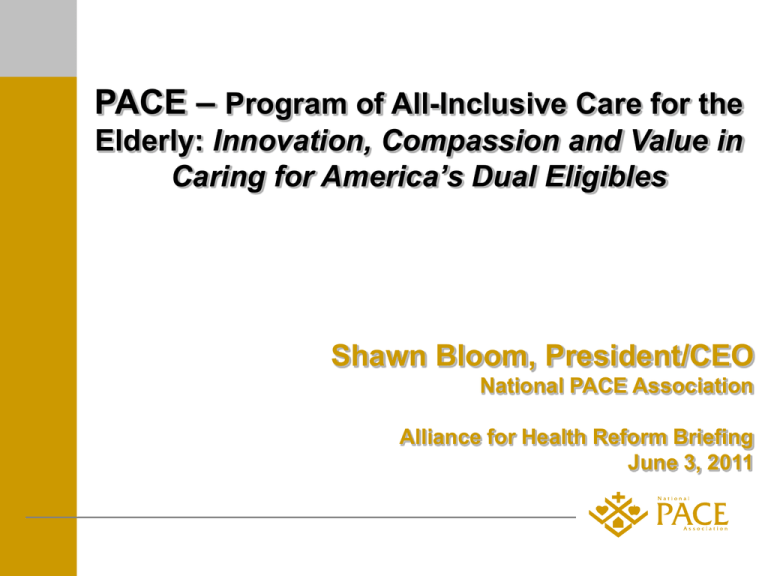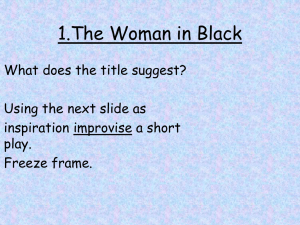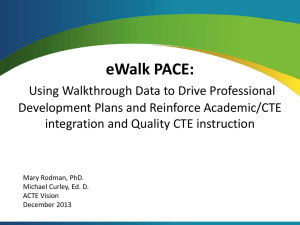Shawn Bloom Presentation - Alliance for Health Reform
advertisement

PACE – Program of All-Inclusive Care for the Elderly: Innovation, Compassion and Value in Caring for America’s Dual Eligibles Shawn Bloom, President/CEO National PACE Association Alliance for Health Reform Briefing June 3, 2011 PACE Provides Community-Based, Comprehensive, Fully-Accountable Care Program of All-Inclusive Care for the Elderly: – Established as a permanent Medicare and Medicaid provider in 1997 – Cares for more than 22,000 people – Includes 76 sponsoring organizations in 29 states • PACE serves people who are: – – – – 55 years or older Living in a PACE service area Certified as needing nursing home care Able to live safely in community with PACE services at time of enrollment PACE is Community-Based • PACE provides innovative, person-centered care for older adults that allows them to stay in their homes and communities and out of nursing homes “PACE’s help in being able to keep mom at home has enabled us to keep our family together.” Family Member of a PACE Participant PACE Provides Coordinated and Comprehensive Care • Employs interdisciplinary teams to deliver and coordinate care across care settings – Doctors, nurses, therapists, social workers, dieticians, personal care aides, and other providers – Day centers, clinics, occupational and physical therapy facilities – Individuals’ homes – Hospitals and nursing homes, if necessary • Bundles Medicare and Medicaid payments to provide full range of health care services – Medical care, social services, and other longterm services and supports Integrated, Comprehensive Care…a More Efficient Use of Health Care Resources • transportation • physical therapy • occupational therapy • recreational therapy • meals • nutritional counseling • speech therapy • respite care • medical care • personal care • prescription drugs • social services • audiology • dentistry • optometry • podiatry • home health care Hospital and nursing home care when necessary PACE is Fully-Accountable for the Cost and Quality of Care Provided • How can we move from successfully treating individual diseases, to successfully caring for individuals? Can we do it for less? – Proven track record in preserving wellness and promoting quality care – Integrated and fixed-rate financing system reduces the cost of care compared to nursing home care substantially – A recent HHS report found PACE generates better health outcomes A Long History Serving Dual Eligibles, Where One Size Does Not Fit All • 90 percent of PACE participants are dual eligibles (Medicare & Medicaid eligible) • Dual eligibles have multiple, complex conditions and benefit from the PACE model of comprehensive, individualized care History and Unique Approach Makes PACE Distinct • 30+ year track record • Direct, hands-on provider • Accepts full financial risk for participants’ cost and health care • Exclusively serves a subset of the dual eligible population – frail, older adults PACE Responds to Tough Health Care Challenges for Families, Providers, Payers For Consumers – participants/caregivers: • Comprehensive, preferred method of care • Stay in the community as long as possible • One-stop shopping For Providers: • Freedom from traditional FFS restrictions • Focus on the entire range of needs of individual For Payers: • Value and predictable expenditures • Comprehensive service package New Opportunities for PACE Recent History Looking Ahead • Number of PACE organizations doubled in last 5 years to 76: – Rural PACE grants – 13 rural programs – More diversity among interested sponsors (e.g., hospices) – State interest in PACE expansion • PACE/Veterans Administration Start-up Program • New demonstrations being developed to – Expand current PACE program and offer the model to different populations that would benefit from its services Questions/Comments www.npaonline.org






